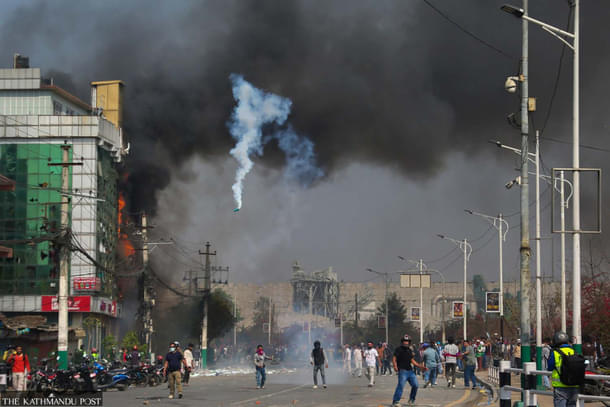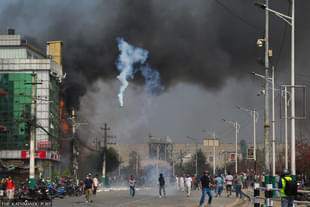World
Hindutva Monarchists & Republican Forces Clash In Nepal — Signs Of More Turmoil
Jaideep Mazumdar
Mar 30, 2025, 02:00 PM | Updated 02:08 PM IST
Save & read from anywhere!
Bookmark stories for easy access on any device or the Swarajya app.


Nepal is in the midst of a bitter and bruising showdown between republican and royalist forces, with former king Gyanendra emerging as the centrepiece of a raging controversy.
Buoyed by the enthusiastic response that Gyanendra received on his return to Kathmandu earlier this month after a tour to many parts of the Himalayan nation (read this), royalist forces who are demanding restoration of Nepal’s status as a constitutional monarchy and Hindu rashtra organised a rally in the country’s capital on Friday (March 28).
The pro-monarchists’ rally at Tinkune in Kathmandu turned violent and left two people—a rallyist and a journalist—dead, scores injured, and a lot of damage to public and private properties. Many police men were also injured in clashes with the rallyists demanding that Nepal be made a constitutional monarchy.
The rallyists indulged in vandalism after police tried to thwart their attempts to break through barricades and march to other parts of the city, including the nearby Tribhuvan International Airport.
The government has accused rallyists of torching private houses and shops, as well as government and private vehicles, looting shops at a shopping mall, vandalising offices of prominent media houses, and even trying to set fire to them.
In the inevitable crackdown that followed, police have so far arrested 111 persons, including leaders of the pro-monarchist Rashtriya Prajatantra Party (RPP). RPP senior vice-chairman Rabindra Mishra, general secretary Dhawal Sumsher Rana (who is also an MP), and pro-monarchy campaigners such as Swagat Nepal, Shepherd Limbu, and Santosh Tamang have been taken into custody.
Police are also searching for Durga Prasai, a controversial businessman who is an ardent royalist. Prasai is said to have triggered the violence by attempting to ram through police barricades with his SUV Friday.
Veteran politician Nawaraj Subedi, 86, the coordinator of the fledgling pro-monarchy movement in Nepal, has been placed under house arrest.
Friday’s violence has left the country shaken and angry. The three main political parties—Nepali Congress (NC), the Communist Party of Nepal-Unified Marxist-Leninist (CPN-UML), and the Communist Party of Nepa-Maoist Centre (CPN-MC)—have strongly condemned the violence and have called for strong action against pro-monarchist forces.
King Gyanendra being blamed
Former king Gyanendra is being blamed for the violence and the republican parties (which means all political parties except for the RPP and its splinter party the RPP-Nepal) have called for curbs being placed on him.
The NC, the largest party in Nepal’s Parliament, has said that king Gyanendra should be held responsible.
“The attacks on media houses, police, and private and public properties were targeted and pre-mediated. We hold the ex-king responsible for the violence,” NC spokesperson Prakash Sharan Mahat told Swarajya from Kathmandu.
CPN(MC) chairperson Pushpa Kamal Dahal called for curbs on the former king. “He (Gyanendra) is responsible, and the freedom that he enjoys now should be curbed. He should be banned from political activities, and his privileges should be withdrawn,” Dahal, who led a bloody insurgency against the monarchy between 1996 and 2006 that killed more than 18,000 people, told Swrajya.
Dahal, a three-time Prime Minister of the country, said that “Gyanendra is encouraging pro-monarchist and pro-Hindutva forces that threaten the secular republic that Nepal is today”.
CPN (UML) general secretary Shankar Pokhrel told Swarajya that Friday’s violence has exposed the true face of the pro-monarchist forces.
“They (the monarchists) say they are offering an alternative to the prevailing political system. But now, people have had a glimpse of the tyranny and oppression that a monarchy will bring about. The younger generation who do not have experience of living under the tyrannical kings should take note of this,” said Pokhrel.
In response to calls by political parties to hold the former king Gyanendra responsible for Friday’s arson and violence, the Kathmandu Metropolitan City—the civic body of the capital city—has slapped a fine of Nepali Rupees 7.93 lakh (INR 4.96 lakh) on Gyanendra.
The stiff penalty has been imposed “for causing environmental damage and destruction of public property”.
Kathmandu Mayor Balendra Shah said eight separate notices have been served on the King at his private residence, ‘Nirmal Niwas’.
But supporters of the former king accused Shah of staging a “stunt”. Monarchists’ calls for raising funds to pay the penalty have evoked a good response in social media.
The pro-monarchy Rastriya Prajatantra Party (RPP), which is the fourth largest party in Parliament, has shrugged off blame for Friday’s violence and has demanded a fair probe.
RPP chief Rajendra Lingden said that a fair probe would reveal that the violence was staged by other parties to discredit the pro-monarchists.
“Friday’s rally was peaceful until the police provoked people by attacking them and firing tear gas canisters. Once the rallyists started fleeing, activists of some other parties entered the scene and indulged in arson and violence to give us a bad name,” Lingden told Swarajya.
The RPP also said that its leaders have been unfairly targeted and arrested and demanded their immediate release. “We will continue our movement demanding restoration of constitutional monarchy,” said Lingden.
The RPP chief condemned attempts to drag former king Gyanendra into the controversy. “He (Gyanendra) had nothing to do with the rally (on Friday) and should be kept out of all controversy,” Lingden added.
Setback for pro-monarchist forces?
Friday’s violence, say political observers, has to some extent discredited the monarchist and Hindutva forces that were gaining considerable ground in the country.
“No one likes violence and disruptions. At a time when the former king and his supporters were gaining sympathy, the violence, arson, vandalism, and hooliganism by the pro-monarchists has punctured their rise and also affected the former king’s image to some extent,” political commentator Kul Bahadur Shrestha told Swarajya.
A leader of the RPP who declined to be named told Swarajya that despite protestations of innocence by his party, Friday’s violence has affected the reputation of the pro-monarchy movement.
“Violence that claimed two innocent lives, and the mindless arson that occurred, has affected the image of the movement. It will take time for the movement to regain the public trust and confidence that had been building up in our favour,” an RPP leader who did not want to be named told Swaraya.
However, some others point to reactions on social media. While many have blamed the king and asked for curbs on the pro-monarchy movement, a huge number of social media users have also expressed support for Gyanendra and the RPP.
“There were calls by some social media users to arrest the former king. ‘#ArrestGyanendra’ started trending Friday evening and early Saturday morning. But others launched a counter by demanding the arrest of CPN-MC chair ‘Prachanda’ (the nom de guerre of Pushpa Kamal Dahal). ‘#ArrestPrachanda’ started trending more and far surpassed the earlier ‘#ArrestGyanendra’. This shows the level of support for King Gyanendra,” RPP leader Uddhav Raj Bhetuwal told Swarajya.
“The overwhelming sentiment is that if Gyanendra is to be held responsible for Friday’s violence, then Prachanda should be prosecuted for the large scale violence and deaths of 18,000 people during the decade of Maoist insurgency,” said Bhetuwal.
Other monarchists feel that Friday’s violence is, at best, a temporary setback to the movement demanding the restoration of constitutional monarchy and Nepal's status as a Hindu rashtra.
“People are disgusted and fed up with the so-called republican political parties, especially the communist parties. People have come to realise that all these parties are only after power and are corrupt to the core. Principles do not matter, and frequent flip-flops by the three major parties who shamelessly form and break alliances with each other with disgusting regularity has angered the masses,” said RPP leader Lingden.
The failure of the three main political parties that have held power in alliance with each other over the last 17 years (since Nepal became a ‘federal democratic republic’ in 2008) to provide stability and ensure social and economic progress and development has made people lose faith in them.
Nepal has seen 14 governments in the past 17 years, three alone over the last two years. At the same time, the economy has remained stagnant, inflation has made life difficult for the common people, corruption and malfeasance by politicians and government officials have increased, constitutional norms and principles are being increasingly violated, and Nepal’s global standing has taken a beating.
All these factors have led to severe disenchantment among the masses. Simultaneously, large-scale conversions to Christianity and Islam since Nepal became ‘secular’ and allowed the entry of Christian missionaries and Islamic preachers have created huge social tensions.
“People have started yearning for a return to the days of the constitutional monarchy. The King is being increasingly viewed as a stabilising factor who can force probity in public life and ensure an end to corruption and political chicanery,” said former NC leader Narayan Rana.
Rana resigned from the NC and left active politics last year after his party joined hands with the CPN-UML (after four earlier alliances between the two parties had collapsed) to form the government. “Nepal’s politics evoke disgust and loathing for politicians. That’s why I left politics,” Rana told Swarajya.
No wonder, then, that former King Gyanendra had been drawing huge crowds during his visits to various parts of the country over the last few months. The pro-monarchist forces have also been gaining strength and have slowly started posing a challenge to the republican parties.
The turmoil that lies ahead
The republican parties are trying to take advantage of widespread condemnation of Friday’s violence and arson to turn the tables on the royalist and Hindutva forces.
But the royalists are determined to fight back. It has been learnt that the RPP and other pro-monarchist and Hindutva parties are planning a series of rallies and marches all over the country to garner support for their demands.
That will pit them in direct confrontation with the republican forces, which will definitely use the state machinery that is in their hands to persecute the royalist and Hindutva forces and defeat their movement.
Nepal is, thus, likely to see more turmoil over the next few weeks and months. How the confrontation between the republicans and royalists will play out depends a lot on how the two sides conduct themselves.
While any punitive action against former king Gyanendra or a heavy-handed persecution of royalist parties and groups will result in a surge of support for the ex-king and his supporters, any more violence by the royalists will discredit their movement and result in loss of public support.
Also read:
Nepal Sees Surging Popular Support For Former King — Will Monarchy Make A Comeback?
Why Nepal Is Seeking Restoration Of Monarchy And To Be A Hindu State Again




